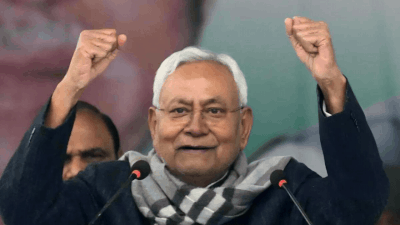- News
- India News
- JDU seeks special financial package from central govt for Bihar
Trending
JDU seeks special financial package from central govt for Bihar
JD(U) demands special status for Bihar in national convention under the Gadgil Formula, seeking Central assistance breakdown, special plan assistance, and tax concessions like in pre-GST era, similar to Assam and Jammu and Kashmir.

NEW DELHI: BJP-led NDA ally Janata Dal (United) on Saturday demanded the central government for grant of special status or special financial package to Bihar with a resolution to the effect being passed in the party's national convention.
Additionally, The party also sought stringent action against paper leak case accused and urged to pass strong law in Parliament to curb exam irregularities.
After the meeting, JD(U) leader Neeraj Kumar said, "Two important proposals were passed during party's national executive meeting today. Party's national president CM Nitish Kumar has decided to make Sanjay Jha party's working president. It was also decided that JD(U) will remain with the NDA."
Party's senior leader KC Tyagi also told that the JD(U)'s national executive meet decided move the apex court against Patna high court's stay on caste reservation.
"Rajya Sabha MP Sanjay Jha has been made national executive president. We will continue to fight for special status and economic package," he also informed.
According to the Gadgil Formula, special category status is bestowed if a state has the following characteristics:
The idea was to help disadvantaged states. The status was first bestowed upon Assam, Nagaland, and Jammu and Kashmir and later extended to Arunachal Pradesh, Himachal Pradesh, Manipur, Meghalaya, Mizoram, Sikkim, Tripura and Uttarakhand. The last state to be granted Special Category Status was Telangana. The rationale is to help states with a low resource base that cannot mobilise resources for development.
However, the centre had previously said it would not entertain demands for 'special category status' from any state, given the 14th Finance Commission's recommendation to abolish it. The SCS was introduced in 1969 to benefit certain backward states with hilly terrains, strategic international borders, and economic and infrastructural backwardness.
Additionally, The party also sought stringent action against paper leak case accused and urged to pass strong law in Parliament to curb exam irregularities.
After the meeting, JD(U) leader Neeraj Kumar said, "Two important proposals were passed during party's national executive meeting today. Party's national president CM Nitish Kumar has decided to make Sanjay Jha party's working president. It was also decided that JD(U) will remain with the NDA."
Party's senior leader KC Tyagi also told that the JD(U)'s national executive meet decided move the apex court against Patna high court's stay on caste reservation.
Tyagi said, "He (CM Nitish Kumar) has announced in front of the national executive that now he will always be a part of the NDA alliance. We will go to the Supreme Court regarding the reservation stayed by the Bihar High Court.
"Rajya Sabha MP Sanjay Jha has been made national executive president. We will continue to fight for special status and economic package," he also informed.
What is the special category status?
The concept was the brainchild of social scientist Dhananjay Ramchandra Gadgil, the deputy chairman of Planning Commission (now Niti Ayog) who formulated the third five-year plan of the Planning Commission.According to the Gadgil Formula, special category status is bestowed if a state has the following characteristics:
- Hilly and difficult terrain
- Low population density or significant tribal population
- Strategic location across borders
- Economic and infrastructural backwardness
- Non-viable nature of state finances
The idea was to help disadvantaged states. The status was first bestowed upon Assam, Nagaland, and Jammu and Kashmir and later extended to Arunachal Pradesh, Himachal Pradesh, Manipur, Meghalaya, Mizoram, Sikkim, Tripura and Uttarakhand. The last state to be granted Special Category Status was Telangana. The rationale is to help states with a low resource base that cannot mobilise resources for development.
However, the centre had previously said it would not entertain demands for 'special category status' from any state, given the 14th Finance Commission's recommendation to abolish it. The SCS was introduced in 1969 to benefit certain backward states with hilly terrains, strategic international borders, and economic and infrastructural backwardness.
End of Article
FOLLOW US ON SOCIAL MEDIA











